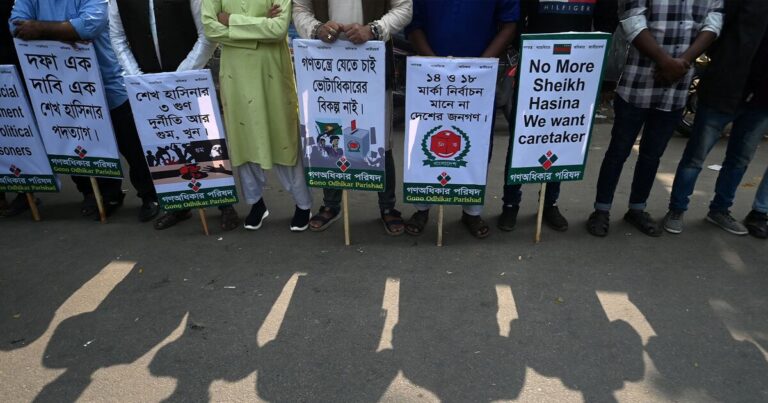The result of Bangladesh’s presidential election on Sunday was never in doubt. Incumbent Prime Minister Sheikh Hasina stands to be elected for a fourth consecutive term after her main rivals boycotted the polls, saying they did not believe it would be free and fair. Prominent opposition politicians have been jailed or disqualified from voting on what supporters say are politically motivated charges.
The election is part of a crackdown by the ruling Awami League party whose effects are reverberating through the fashion supply chain. Bangladesh is the world’s second-largest garment exporter after China, and the garment industry is one of the country’s biggest employers. But many of these workers earn poverty wages, and a fight over minimum wages that led to mass protests late last year has faced heavy government repression.
Western brands say there is little they can do: they fear that unilaterally forcing factories to raise wages would allow unscrupulous competitors to undercut their prices. Pulling out of Bangladesh altogether is neither attractive nor ethical: other garment-making hubs face similar challenges, and shifting operations would risk mass unemployment for the workers the brands are trying to support. If anything, Bangladesh is only likely to become more important as retailers look to diversify away from China.
But if Sunday’s election marks the start of a new cycle of protests, violence and strikes, it could prompt fashion companies to offer more meaningful support to garment workers and the United States and EU to pressure the Bangladeshi government to shun its opponents. Such actions would not be unprecedented: The U.S. government has restricted imports of products made with cotton from China’s Xinjiang region over the country’s treatment of its Uighur minority, and Rana Plaza has actually marked a change in the way Bangladesh’s garment industry operates.
But don’t expect any major changes after Sunday’s election: the fashion industry may choose to sit back and wait until the deterioration of Bangladesh’s democracy becomes more visible to Western consumers.
Other things to note this week
Sunday
Bangladesh holds general elections
Golden Globe Awards return to TV for the first time since 2021
Monday
Brunello Cucinelli reports results as luxury earnings season kicks off
Eurozone releases November retail sales
Tuesday
Pitti Uomo kicks off in Florence with guest designers including Luca Mariano and SS Daily, and brands like Todd Snyder, Tod’s and Guess presenting new collections.
Eurozone releases November unemployment rate
Wednesday
Aritzia Reports Quarterly Results
Thursday
US reports December inflation data
Friday
Milan Men’s Fashion Week kicks off with Gucci’s first men’s show by Sabato de Sarno
Saturday
The shows continue with Dolce & Gabbana, Emporio Armani and more
The Week Ahead wants to hear from you, so send your tips, suggestions, complaints and compliments to brian.baskin@businessoffashion.com.


